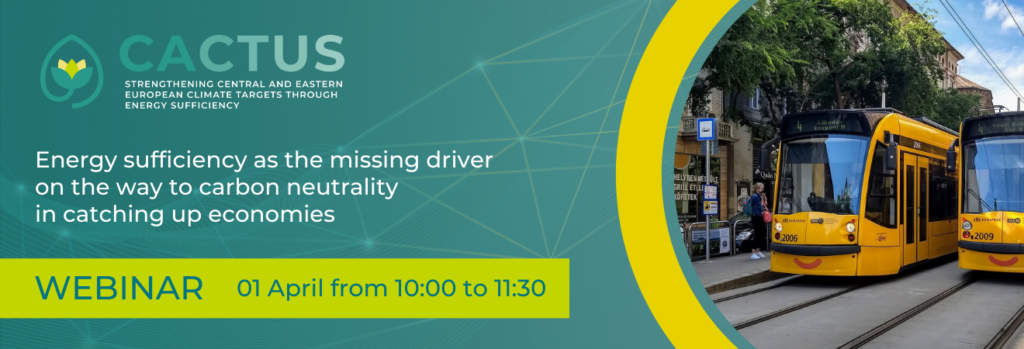Webinar on energy sufficiency in “catching up economies”
Energy sufficiency as the missing driver on the way to carbon neutrality in “catching up economies”
Replay available !

While energy efficiency policies have become mainstream in OECD countries, energy consumption is still increasing, so that there is still a long way to go to reconcile with 1.5 degrees compatible pathways. In Central and Eastern Europe, energy consumption levels are catching-up rapidly, leading the way for emerging economies worldwide. Energy sufficiency is key to address this increase of energy consumption, and can act as a key complement to efficiency and renewables on the path to carbon neutrality, but also to a deeper environmental sustainability beyond just climate aspects.
In the framework of the CACTUS project and on the sides of the 2022 Berlin Energy Transition Dialogue, the négaWatt Association, Fraunhofer ISI, the REKK Foundation and the Lithuanian Energy Institute organised a webinar dedicated on energy sufficiency.
In this session, experience from designing scenario pathways based on sufficiency, efficiency and renewables from Germany and France were complemented by examples on the integration of sufficiency from the CACTUS project in Hungary and Lithuania and from scientific literature and global models aiming at 1.5°C target and submitted to the IPCC. Solutions were presented and discussed to integrate sufficiency into climate and energy scenario models and strategies and of European countries and beyond.

The webinar took place back to back with a presentation of the EnSu energy sufficiency policy database, providing for a comprehensive sufficiency BETD side-event session.
>> The recording is available below, and the slideshow can be downloaded here.
Agenda
- 10:00 – Introducing energy sufficiency and the need for sufficiency modelling, Yves Marignac, Head of Analysis, négaWatt association, France
- 10:10 – The potential for sufficiency in catching-up economies – examples from the buildings and transport sectors in Hungary and Lithuania, Mária Bartek-Lesi, Senior research associate, REKK Foundation, Hungary and Inga Konstantinaviciute, Chief research associate, Lithuanian Energy Institute, Lithuania
- 10:30 – An insight into sufficiency policies and good practice examples and instruments from Germany, Mahsa Bagheri, Research associate, Fraunhofer ISI, Germany
- 10:40 – The need for sufficiency policies in the international context – comments and viewpoint from an IPCC lead author perspective, Yamina Saheb, Lead Author UN IPCC WGIII report on climate mitigation
- 11:00 – Open Q&A session
- 11:25 – Conclusion: what prospects for sufficiency in Europe and beyond?
Moderation: Stephane Bourgeois, CACTUS project coordinator and European relations and policy manager, négaWatt association
Background
Sufficiency expert Yves Marignac from négaWatt introduced the session, by coming back on the rationale behind energy sufficiency, the links with efficiency as well as on challenges relating to integrating sufficiency thinking in classical climate and energy models. He presented negaWatt’s 20 years of experience and successes with modelling and promoting sufficiency in France and recent efforts to address the European energy and climate area. The EUKI CACTUS project, researching the integration of sufficiency in the specific context of Central and Eastern European catching-up economies at the time of the “fit for 55” package was also introduced.
Key insights from the CACTUS research project followed, with examples relating to identifying the sufficiency gaps and potentials in the Hungarian and Lithuanian residential building and passenger transport sectors. Mária Bartek-Lesi from REKK and Inga Konstantinaviciute from LEI presented sufficient target levels for 2050 on key sufficiency indicators as from the CACTUS technical dialogue, tailored to the local context of catching-up economies facing relatively high energy poverty. Assumptions behind them, including potential policies and first results from integrating those into the classical energy and climate models from the target countries were also presented, as well as impacts, and were followed by examples of energy sufficiency policies and good practices, particularly from Germany presented by Mahsa Bagheri from Fraunhofer ISI.
IPCC lead author Yamina Saheb provided feedback on the results mentioned above based on her assessment of the literature and narratives of global scenarios aiming at 1.5 degree target without negative emissions. She also discussed North/South differences and in the inclusion of sufficiency in policies and modeling.
Stephane Bourgeois moderated the panel and the Q&A sessions as CACTUS project coordinator with his European and international cooperation policy background. He concluded the workshop with prospects for sufficiency in Europe and beyond.
About the CACTUS project
CACTUS is a project on energy sufficiency and its integration into climate and energy strategies in the Central and Eastern European context funded by the European Climate Initiative EUKI. It sensitises key scenario builders, policy makers and wider EU and climate and energy stakeholders on energy sufficiency, and explores its integration in Hungarian and Lithuanian scenario models.
Since the Summer 2020, the négaWatt association has been coordinating the implementation of the Cactus project with its partners REKK, LEI and the Fraunhofer ISI, and with the financial support of the EUKI fund of the German Ministry of the Environment BMU.
négaWatt is one of the key actors in Europe working on energy sufficiency. This non-for profit think tank works closely with key decision-makers in France (Institutions and economic actors) and Europe to exchange expertise and promote coherent measures and policies. It is working on a European energy and climate scenario that evaluates all potentials for energy demand reduction (sufficiency and efficiency) and renewable energy development, with first results to be published this year.
